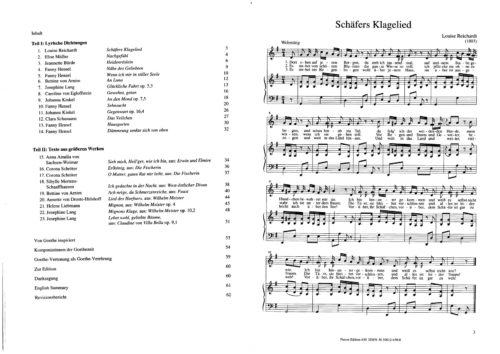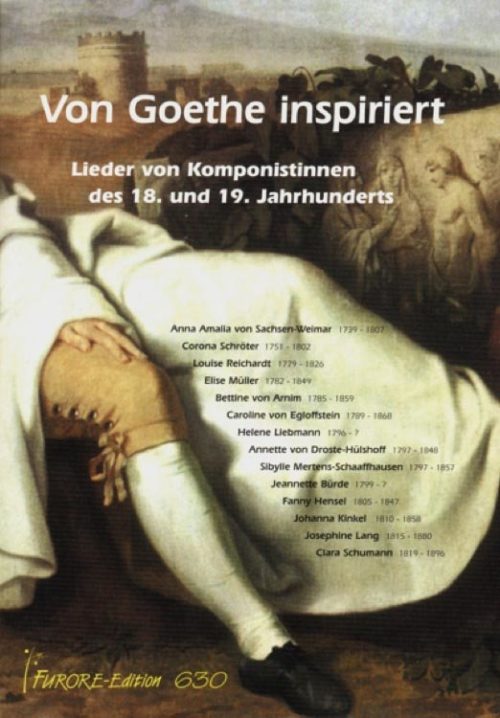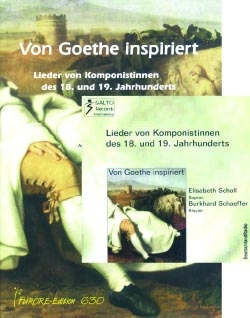The composer, pianist, choral director, poet, journalist, novelist, music teacher and historian Johanna Kinkel ( Mockel ), was born on 8 July 1810 in Bonn. Her father, a teacher at the French Gym-nasium, and mother encouraged their daughter’s musical talents. They chose Franz Anton Ries (1755-1846), Beethoven’s childhood violin instructor, to be her piano and composition teacher. With Ries support, Johanna began a career as a coach, accompanist and choral director while still in her teens. He also helped her to publish Die Vogelkantate, her Op. 1, in 1830.
In 1832, Johanna married the Cologne music merchant Johann Paul Mathieux, but she left the abusive relationship in less than six months. Divorce proceedings lasted for several years. After a long period of debilitating depression, Johanna was able to resume her artistic career. Dorothea Schlegel arranged for her to meet Felix Mendelssohn in 1836. He strongly encouraged her to pursue a musical career. Following his advice, she moved to Berlin in November of that year and studied with Karl Böhmer and Wilhelm Taubert. Johanna financed her stay in Berlin by giving private piano lessons. Her pupils included the daughters of Bettina von Arnim. She frequented the most elite literary circles and performed in Fanny Hensel’s Sunday Musicals. The most famous houses and salons were open to her. During these exciting years her Lieder, Op. 6 – 12 were published. Important critics, among them Ludwig Rellstab and Robert Schumann, wrote glowingly about her compositions.
Because of pending divorce proceedings, Johanna returned in 1839 to provincial Bonn. She was soon involved again as a conductor, performer, and composer with various chamber music and vocal ensembles in her home. Johannaâ’s Gesangverein was one of the first choral groups in Germany to be conducted by a woman. In 1842, she, a Catholic divorce, married the Protestant theologian, poet and university lecturer Gottfried Kinkel. Together they founded a literary group, the Maikäferbund.
Johanna Kinkel’s literary and musical circles collapsed in 1848, the year of revolutionary upheaval in Germany. Gottfried Kinkel was chosen by the democratic electorate to represent Bonn in the National Assembly in Berlin. There he was arrested and condemned to death for his political activities. Johanna, with the help of Bettina von Arnim and others, was able to have his death sentence overturned and changed to life imprisonment. Karl Schurz, organized Gottfried’s escape from Spandau prison and helped him to find exile in London. Johanna and their four children joined him there in 1851. She fully supported her husband in his political pursuits in their adopted country and the Kinkels soon became the center of the expatriate German community. To earn a livelihood Johanna, whose English was very good, gave piano lessons, taught singing to small children and published two books on music education. She again directed a choir and wrote music, librettos, poetry and a two-volume novel. An article on Frederic Chopin as Composer and another on the works of Felix Mendelssohn published after her death come from his period. But it was also a time of depression and despair. Besides her many musical activities, she was almost solely responsible for the household and their children. Gottfried continued his political activities and was perhaps unfaithful.
On 15 November 1858, Johanna’s body was found in the garden of her home. She had either fallen or had jumped from the window of her third floor bedroom. While suicide was suspected, it could not be proven. Johanna was not forgotten in her native country. She lived in the memory of German intellectuals as an eccentric revolutionary and as a musician with a broad cultural background. The words Freiheit, Liebe und Dichtung (Freedom, Love, and Poetry) were inscribed on her tombstone.
See also Von Goethe inspiriert gleichnamiger Notenband und CD auf CD: siehe CD
-


fue 6300
Inspired by Goethe. Songs by women composers of the 18.th and 19.th Centuries
Anna Amalia, Herzogin von Sachsen-Weimar Annette von Droste-Hülshoff Bettine von Arnim Caroline von Egloffstein Corona Schröter Elise Müller Fanny Hensel, geb. Mendelssohn Helene Liebmann Jeanette Bürde, geb. Milder Johanna Kinkel, gesch. Mathieux, geb. Mockel Josephine Lang Louise Reichhardt Sibylle Mertens-Schaafhausen
-

fue 9997
Music book + CD: Inspired by Goethe. Songs by women composers of the 18.th and 19.th Centuries
Anna Amalia, Herzogin von Sachsen-Weimar Annette von Droste-Hülshoff Bettine von Arnim Caroline von Egloffstein Corona Schröter Elise Müller Fanny Hensel, geb. Mendelssohn Helene Liebmann Jeanette Bürde, geb. Milder Johanna Kinkel, gesch. Mathieux, geb. Mockel Josephine Lang Louise Reichhardt Sibylle Mertens-Schaafhausen

